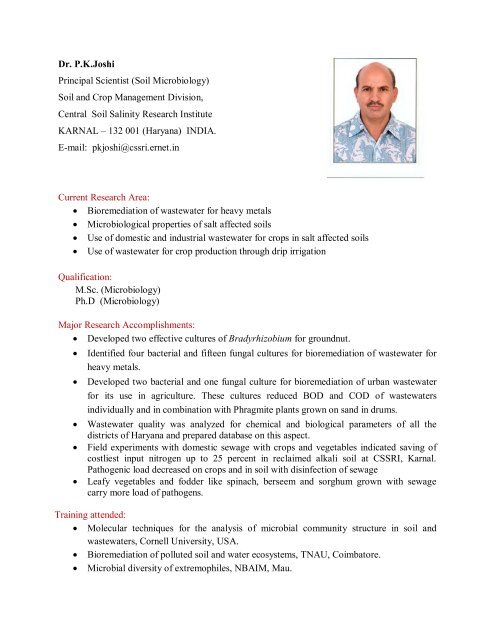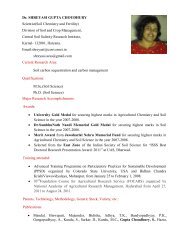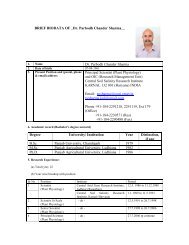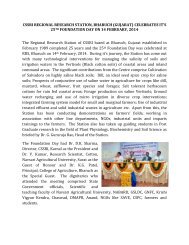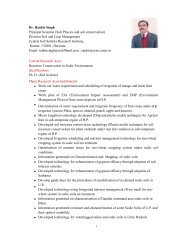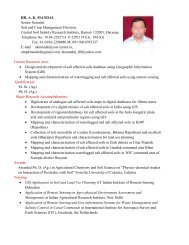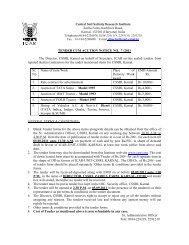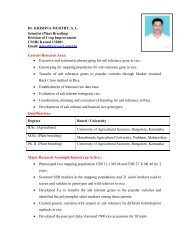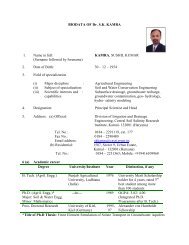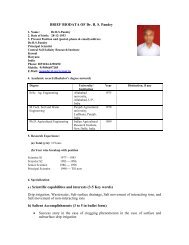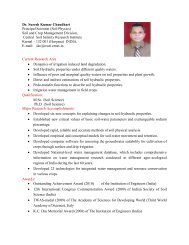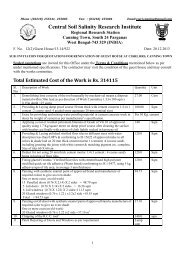Dr. P.K.Joshi Principal Scientist (Soil Microbiology ... - CSSRI Karnal
Dr. P.K.Joshi Principal Scientist (Soil Microbiology ... - CSSRI Karnal
Dr. P.K.Joshi Principal Scientist (Soil Microbiology ... - CSSRI Karnal
Create successful ePaper yourself
Turn your PDF publications into a flip-book with our unique Google optimized e-Paper software.
<strong>Dr</strong>. P.K.<strong>Joshi</strong><strong>Principal</strong> <strong>Scientist</strong> (<strong>Soil</strong> <strong>Microbiology</strong>)<strong>Soil</strong> and Crop Management Division,Central <strong>Soil</strong> Salinity Research InstituteKARNAL – 132 001 (Haryana) INDIA.E-mail: pkjoshi@cssri.ernet.inCurrent Research Area: Bioremediation of wastewater for heavy metals Microbiological properties of salt affected soils Use of domestic and industrial wastewater for crops in salt affected soils Use of wastewater for crop production through drip irrigationQualification:M.Sc. (<strong>Microbiology</strong>)Ph.D (<strong>Microbiology</strong>)Major Research Accomplishments: Developed two effective cultures of Bradyrhizobium for groundnut.Identified four bacterial and fifteen fungal cultures for bioremediation of wastewater forheavy metals.Developed two bacterial and one fungal culture for bioremediation of urban wastewaterfor its use in agriculture. These cultures reduced BOD and COD of wastewatersindividually and in combination with Phragmite plants grown on sand in drums.Wastewater quality was analyzed for chemical and biological parameters of all thedistricts of Haryana and prepared database on this aspect.Field experiments with domestic sewage with crops and vegetables indicated saving ofcostliest input nitrogen up to 25 percent in reclaimed alkali soil at <strong>CSSRI</strong>, <strong>Karnal</strong>.Pathogenic load decreased on crops and in soil with disinfection of sewageLeafy vegetables and fodder like spinach, berseem and sorghum grown with sewagecarry more load of pathogens.Training attended: Molecular techniques for the analysis of microbial community structure in soil andwastewaters, Cornell University, USA. Bioremediation of polluted soil and water ecosystems, TNAU, Coimbatore. Microbial diversity of extremophiles, NBAIM, Mau.
DNA sequencing and microbial Identification module of agriculturally Importantmicroorganisms, NBAIM, Mau.Patents, Technology, Methodology, Genetic Stock, Variety, etc.:Developed two effective cultures of Bradyrhizobium for groundnut.Identified four bacterial and fifteen fungal cultures for bioremediation of wastewater forheavy metals.Developed two bacterial and one fungal culture for bioremediation of urban wastewaterfor its use in agriculture. These cultures reduced BOD and COD of wastewatersindividually and in combination with Phragmite plants grown on sand in drums.Publications: <strong>Joshi</strong>, P.K., Swarup, A., Maheshwari, S., R, Kumar and Singh, N (2011).Bioremediation of heavy metals in liquid media through fungi isolated fromcontaminated sources. Indian. J.Microbiol (Online)<strong>Joshi</strong>, P.K., Kumar, R., Rajput, V.D., and Singh, N (2010).Isolation and screening ofbacterial isolates for tolerance to heavy metals. Journal of <strong>Soil</strong> Salinity and WaterQuality. 2:12:17Minhas,P.S., Sharma, N., Yadav, R.K. and <strong>Joshi</strong>,P.K. 2006. Prevalence and control ofpathogenic contamination in some sewage irrigated vegetable, forage and cereal graincrops. Bioresource Technology. 97:1174-78.Yadav, R.K.,Chaturvedi,R.K., Dubey,S.K., <strong>Joshi</strong>,P.K. and Minhas,P.S. 2003. Potentialsand hazards associated with sewage irrigation in Haryana. Indian J.agric.Sci. 73(5): 247-55.


